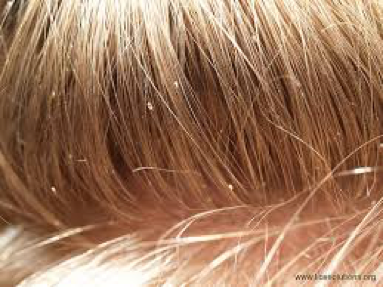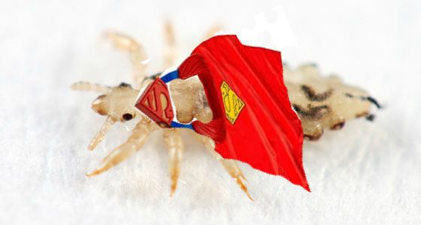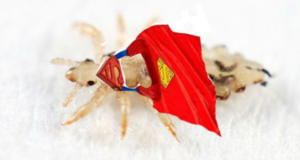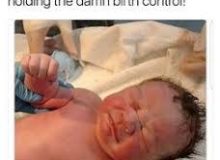Ain’t Nothing Nice About Super Lice!
Super Lice, how to recognize them and what to do about them
By: Idries J. Abdur-Rahman, MD, FACOG
By now you have no doubt heard about the exploding super lice epidemic. Super Lice have been found in 48 of the 50 U.S. states. While these numbers are eye popping indeed, they actually pale in comparison to the numbers found just north of America’s border. In Canada, super lice now account for a shocking 97% of all cases of head lice seen. So what should those of us who want to keep our heads free of Super Lice do? Should we all just go off of the grid and avoid any and all people who might be harboring Super Lice? Should we withdraw our children from school, quit our jobs and head for the hills? Maybe we should just board up our windows, barricade our doors and shave our heads. After all, bald is cool again! And, if we don’t have hair then we won’t be at risk for Super Lice, right? Well these are all approaches to consider for sure, but for those looking for options that are a little less drastic, read on. Twin Doctors TV does have some options for you.
So, lets start with a little information about what exactly Super Lice are?
As much as we may wish that Super Lice were these super cute little critters running around in tight tights with these super awesome capes hanging from around their necks, that unfortunately just isn’t the reality of Super Lice. Instead, Super Lice are just your everyday run of the mill, non-cape wearing head lice. What makes them “super” though is the fact that, while they are your average run of the mill head lice, they are becoming increasingly resistant to the normal over-the-counter (OTC) medications that have successfully treated lice for decades. So they are “super” alright, super resistant to medications and super hard to kill!
So How Do You Get Head Lice?
An ounce of prevention is worth a pound of cure. So, rather than getting Super Lice that you then have to struggle to get rid of, it might be worthwhile knowing how to avoid head lice altogether. Head lice, aka Pediculus Humanus Capitis are wingless parasites that are distinct from other types of common louse like the Body Louse and the Pubic Louse. Head Lice, much like Body Lice and Pubic Lice however are transmitted from person to person by direct contact. Direct contact is required because, without wings, Lice cannot fly from one person’s body to the next. Now that is key because that means that exposure to Lice CAN be avoided. To avoid exposure, just avoid direct contact with the creepy little parasites. Because once direct contact with Lice has occurred, you are infested. And once you are infested, these uninvited guests will survive and thrive in your hair by simply attaching themselves to your scalp and feeding off of the blood that flows beneath your skin. But, if you avoid making contact with Lice by avoiding places where they like to hangout (i.e. infested pillows and infested accessories like hats, scarfs, brushes, combs, pillows, etc that potentially may come in contact with lice; then you’re in the clear.

Super Lice and Their Nits in a Persons Hair
So, what are the signs that you may have lice?
Well diagnosing hair lice is pretty simple to do actually. No in-depth expensive testing is required. All that is required are two properly functioning eyes and a strong stomach. So if someone has a persistently itchy scalp, and inspection of their hair by someone with said strong stomach and two properly functioning eyes reveals 1 – white wingless “insects” crawling around in the hair and 2- white round nits (lice eggs) at the base of the hair shafts; then lice are present. It is that simple. No fuss no muss!
So how do you treat lice?
- Medicate. Get an OTC anti-lice medicated shampoo that has Permethrin or Pyrethrin. If in doubt, your local pharmacist can point you in the right direction.
- Make sure that you follow the FULL 14-day regimen below without skipping any steps. Note, you only use the medicated shampoo on the 1st and the 10th days of treatment (see treatment calendar below).
- Get a special nit comb. The teeth of a regular comb and too far apart and not fine enough to clear the hair of both lice and their nits. So make sure that you but a Nit Comb and use it to clear the nits. Again if in doubt, your local pharmacist can point you in the right direction.
- Treat all infested family members at the same time. Everyone infested should be treated at the same time; and while they can all share the medications used, everyone should have their own nit comb.
- Wash all bedding and clothing using hot water. This will help to ensure that no Lice of Lice nits remain on bedding or clothing one an infestation has been cleared.
- Freeze hair accessories like combs and brushes if you must keep them. Placing accessories in the dishwasher does not eradicate Lice or Lice nits as well as freezing does.
- Vaccum common-use areas like the couch and carpet. Generally only dead or dying lice will be found here, but this is an extra precaution that should be taken.
- Though common place, shaving the hair is not necessary, and resorting to a bald head is really quite an extreme step to take. But for those who don’t mind sporting a bald head for a few weeks, it can be a quick and easy fix.
- Kids with lice do not have to stay out of school during the entire treatment period, but at least the first treatment should be administered before allowing them to return to school. While being treated though, the school should be advised about the infestation so that other parents can examine their children for signs of lice as well.
How will I know if Infesting Lice are Super Lice, and how can I treat Super Lice if they are present?
If you or someone that you care about has completed the normal over-the-counter treatment course detailed above correctly, and if the lice and their nits still exist; then congratulations, your lice aren’t just lice, they’re Super Lice! SO what to do if your lice are Super Lice? Well, firstly make an appointment to see your doctor so that your Doctor can examine you to make sure that a diagnosis of Super Lice is in fact correct. After this examination, if it is found that your lice are indeed Super Lice, then your Doctor will likely recommend that you try a second OTC anti-lice medication that has different active ingredients from the first one that you used. If this second medication doesn’t work, then your Doctor will likely give you a prescription strength anti-lice medication.








 May 19, 2018
May 19, 2018 


 October 26, 2020
October 26, 2020 
